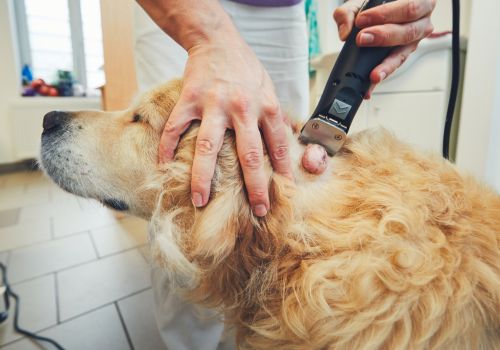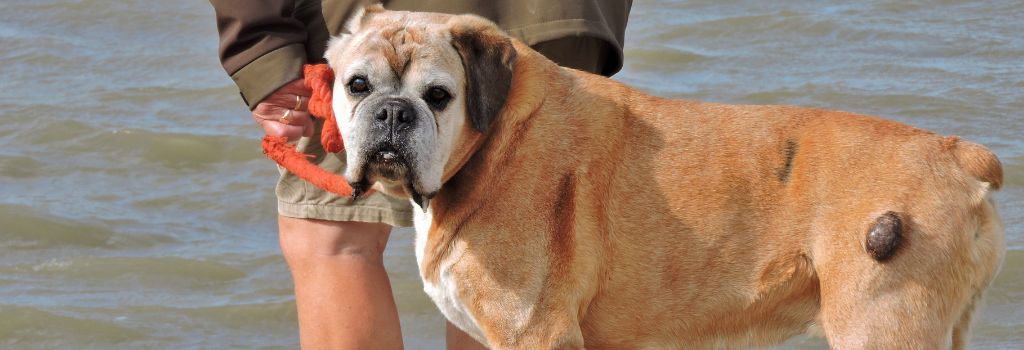Cancer is a diagnosis that is scary for any pet owner to hear, especially since it is known to be one of the leading causes of death in dogs. However, with early detection and diagnosis, pet owners have the opportunity to give their beloved canine friend the chance to fight the disease and extend their life.

At Veterinary Center of Hardyston, we understand the importance of early detection and diagnosis of cancer in dogs and are here to provide pet owners with the highest quality and best service. In this article, we will discuss the most common types of cancer in dogs, signs and symptoms, why early detection and diagnosis are so important, how a veterinarian will diagnose cancer, treatment options, and possible side effects.
What Are the Most Common Types of Dog Cancer?
Various types of cancer can affect dogs, but the most common are lymphoma, bone tumors, mast cell tumors, melanoma, osteosarcoma, hemangiosarcoma, mammary gland carcinomas, and transitional cell carcinoma.
Lymphoma (Lymphosarcoma) is a cancer commonly found in multiple lymph nodes and can occur in almost any part of the body. Mast cell tumors occur mainly in the skin or just underneath it, while melanomas usually occur around the mouth or feet. Osteosarcoma is a very painful form of bone cancer that is often found in larger breed dogs. Hemangiosarcomas occur in blood vessels and lead to internal bleeding, and mammary gland carcinomas are especially common in female dogs. Lastly, transitional cell carcinoma affects the urinary bladder.
What Are the Signs and Symptoms of Dog Cancer?
The signs and symptoms of cancer in dogs vary depending on the type and stage of the cancer. Early symptoms can include sudden or unexplained weight loss, lack of appetite, fatigue, abnormal swelling or lumps on the body, difficulty breathing, poor coat quality, vomiting, diarrhea, lameness or limping, and changes in bathroom habits. If your pet is displaying any of these symptoms, it’s important to make an appointment with a veterinarian as soon as possible to diagnose and treat your pet.

Why Is Early Detection and Diagnosis of Cancer in Dogs So Important?
Early detection and diagnosis of cancer in dogs is essential for successful treatment. Emerging tools like genomic tests are showing promise for early detection of canine cancers, with one test in particular, known as the multicancer early detection test (MCED), screening for genetic biomarkers in blood or other bodily fluids. Routine veterinary checkups and regular lab work are also important for early detection. During these checkups, veterinarians may examine lymph nodes, perform abdominal palpation, rectal exams, and thorough oral exams. Any abnormalities found may prompt additional lab tests or imaging such as x-rays or ultrasounds.
Pet owners also play a critical role in the early detection of cancer in their dogs. They should monitor their pets for any physical changes, such as lumps or bumps, and ensure regular veterinary appointments for their pets. Understanding the potential predisposition of certain breeds to specific types of cancer can also help pet owners be more aware and proactive about their pet’s health.
How Does a Veterinarian Diagnose Cancer in a Dog?
Veterinarians rely on a combination of medical history, physical examination, and additional tests such as radiographs (x-rays), blood tests, and ultrasound exams to diagnose cancer in dogs. Cytology, which involves withdrawing some cells from a mass for examination under a microscope, can provide basic information about the tumor type and confirm a diagnosis for certain types of cancer. For many tumors, a biopsy – taking a tissue sample from the neoplasm for microscopic examination – is often necessary to confirm the diagnosis and determine if the neoplasm is benign or malignant. Advanced imaging, such as computed tomography (CT) scans and magnetic resonance imaging (MRI), are also used in detecting cancers.

What Are the Treatment Options for Dogs With Cancer
There are several treatment options for dogs with cancer, depending on the type and location of the cancer. Surgery is often the first line of treatment and can be used to remove tumors or cancerous cells. Chemotherapy and radiation therapy are also commonly used to treat cancer in pets, while innovative veterinary drugs such as Tanovea-CA1 and Laverdia-CA1 have been approved by the FDA to target certain types of canine cancers specifically.
What Are the Side Effects of Cancer Treatments?
in Pets Cancer treatments in pets can lead to side effects that can impact the health and well-being of the pet. Chemotherapy drugs do not differentiate between cancer cells and normal cells, leading to some of the common side effects, such as bone marrow suppression, gastrointestinal problems, alopecia or hair loss, cardiotoxicity, and renal toxicity. Radiation therapy is also associated with a range of side effects, such as fatigue and skin changes at the site of treatment. Pets may also experience a loss of appetite, increased hunger, vomiting, or diarrhea after a dose of any chemotherapeutic drug. Dehydration may also occur following vomiting, diarrhea, or excessive urination and may require fluid administration for recovery.
Pet owners need to be aware that caring for pets undergoing cancer treatment might increase their risk of getting an infection. To reduce this risk, it’s important to maintain good hygiene and avoid rough play that could lead to bites or scratches.
Conclusion
Cancer is a serious and scary diagnosis for any pet owner, but with early detection, pet owners can give their beloved sidekicks the chance to fight the disease and extend their life. At Veterinary Center of Hardyston, we provide the highest quality and best service to pet owners to ensure their pets receive the most up-to-date care available. We understand the importance of early detection and accurate diagnosis of cancer in dogs and are here to help.
If you live in or near Hamburg, NJ, contact us today at (973) 425-5146 to set an appointment or if you have any questions about dog cancer.

